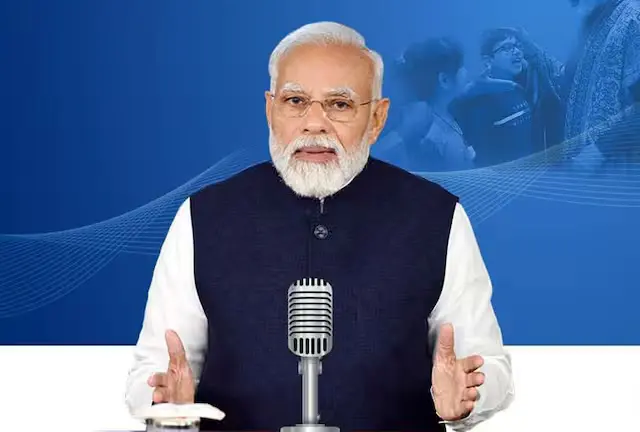A savage terrorist attack killed 26 touristic travelers and injured multiple victims in the breathtaking Baisaran valley of Pahalgam, where local people once referred to it as “Mini Switzerland” because of its peaceful landscapes. The violence led to the deaths of one local resident together with both a UAE citizen and a Nepalese citizen, which established this attack as the most lethal in Jammu & Kashmir since the 2019 Pulwama tragedy.
PM Modi Cuts Short Saudi Trip
The Prime Minister Narendra Modi immediately returned to India from Saudi Arabia on April 23 for an urgent Cabinet Committee on Security (CCS) meeting at Delhi airport. “At the high-stakes CCS meeting, National Security Advisor Ajit Doval joined forces with External Affairs Minister S. Jaishankar and Foreign Secretary Vikram Misri to craft India’s strategic response.”
The perpetrators responsible for this evil act will face no mercy. During his national address, PM Modi affirmed that our struggle to combat terrorism bears no weakness and our determination remains absolute strength.
Also check:- Increased LoC Tensions Amid Army Chief’s Visit
Home Minister Amit Shah On Ground: India on High Alert
Amit Shah quickly reached Srinagar after his appointment as home minister. “Wasting no time, Home Minister Amit Shah rushed to Srinagar following the attack, visiting the tragic site and offering heartfelt assurances of full government support to grieving families.”
Nationwide security forces received heightened alert status while additional troops took positions at both border points and vital tourist locations in Jammu & Kashmir.
“Displaying swift vigilance, IC-90034 of the Chinar Corps intercepted two infiltrators in Baramulla’s Uri sector—an action that likely averted another devastating attack.”
The expedition uncovered both the military’s preparedness and its continual state of alert.
Global Condemnation: World Stands with India
The international community rallied behind India, expressing grief and solidarity:
- Donald Trump: “Extremely sad. America stands with India.”
- Vladimir Putin: “A barbaric crime. Russia supports India’s fight against terrorism.”
- UAE, France, Japan, and EU leaders echoed similar sentiments, emphasizing the need for global cooperation to combat terrorism.
India’s Counter-Strike: Diplomatic and Strategic Moves Announced
India enacted decisive diplomatic measures and security actions following the Pahalgam terror attack by suspending the Indus Water Treaty while also announcing border closures at Attari-Wagah from May 1, together with a 48-hour deadline for Pakistani nationals to exit the nation. The security forces have stepped up their presence along all border areas. The actions demonstrate India’s decisive reaction to cross-border terrorism while showing its complete opposition to such attacks.
In a rare moment of political unity, leaders across party lines joined hands. Congress leader Rahul Gandhi cut short his U.S. trip to return for a CWC meeting and plans to visit the victims’ families.
From Delhi to Srinagar, voices rose in unison—India will not bow to terror.
A Nation Mourns: Heart-Wrenching Tributes Across India
The grief is national, and the tributes deeply personal:
- “Shubham Dwivedi from Kanpur was given a heartfelt farewell in the presence of Uttar Pradesh Deputy Chief Minister Brajesh Pathak, who joined grieving loved ones to honor his memory.”
- “In Guwahati, IAF Corporal Tage Helyang was laid to rest with full military honors, a solemn tribute to his service and sacrifice.”
- Vinay Narwal, an Indian Navy officer, was honored in Karnal amidst emotional farewells.
Pahalgam Attack Increases Tensions Between India and Pakistan, Threatening Regional Stability
The separatist strike in Pahalgam of Indian-administered Kashmir led to 26 tourist deaths, thus igniting fresh tensions between Pakistan and India. The recent separatist attack in Pahalgam damaged both India and Pakistan to the point that they initiated aggressive movements that threaten to start serious conflict in the South Asian region.
Immediately after the attack, India cut off its involvement in the Indus Waters Treaty and declared Pakistan to close its land border. The Pakistani National Security Committee declared with strength that disturbing the water supply to Pakistan would lead to a full-blown “act of war.” The country chose to suspend every current bilateral agreement, starting with the important 1972 Simla Agreement.
Defense Minister Rajnath Singh, along with other Indian officials, implied that a military operation should occur similar to the 2019 Balakot airstrikes. The Pakistani higher-ups retain their defensive stance yet they claim India rushes to judgment without showing proof involving Pakistan in the incident.
The Himalayan part of Kashmir functions as the primary conflict zone following a prolonged period of battles in this same area. Security analysts predict that new military action would trigger unpredictable escalation because both countries possess strong military arsenals and deal with complex relations with China.
According to analysts, diplomacy stands as the only solution to prevent a worsening crisis throughout both nations despite current high emotion. The path toward peace appears to become more challenging because both nationalist passions are rising together with decreasing communication opportunities.
Tourism Industry Crumbles: Travel Cancellations and Economic Setbacks
The act of terror at Pahalgam resulted in 26 fatalities, which badly affected the hospitality sector in Kashmir. Major booking websites reveal that customer cancellations have increased and their future reservations reduced by 40%. Organizations now give their customers opportunities to change bookings without charge or reschedule dates at no cost.
The tragic incident has severely impacted the economy of the region by threatening travel businesses in Pahalgam and reducing the projected GSDP growth in Jammu & Kashmir. The incident reveals Kashmir’s delicate state of security along with an escalating challenge for the local hospitality industry to maintain business success despite growing concerns about safety.
Timeline: Key Actions in the First 24 Hours
| Timeframe | Actions Taken |
| Within 6 Hours | PM Modi lands in Delhi, chairs emergency CCS meeting |
| Within 12 Hours | NSA activates nationwide counter-terror protocols |
| Within 18 Hours | Amit Shah visits Pahalgam, meets grieving families |
| Within 24 Hours | Two terrorists killed in Baramulla infiltration attempt |
| End of Day | Indus Treaty suspended, border closure announced |
The Pahalgam terror attack of 2025 has pierced the nation’s heart—but from this tragedy rises a powerful resolve. India grieves, but it does not break.


